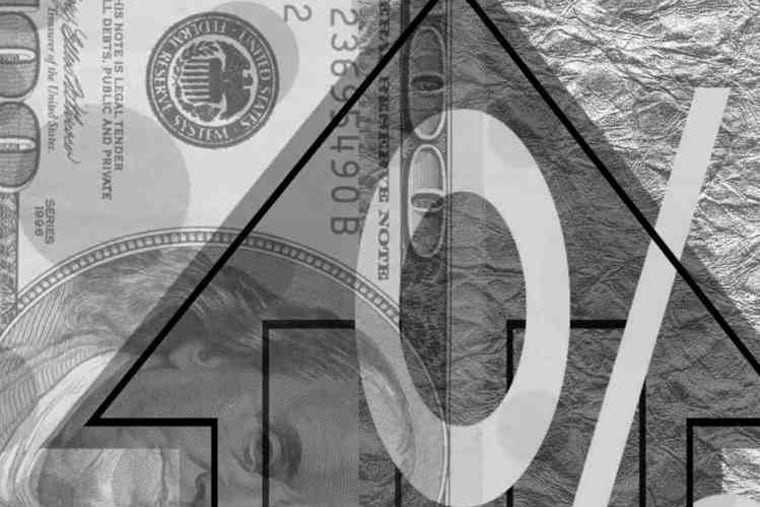PhillyDeals: Pioneer of mortgage-backed securities buys Plymouth Meeting firm
A Wall Street veteran who developed the mortgage-backed securities that financed the real estate market during its long rise has bought control of a Plymouth Meeting firm and plans to make it a base for refinancing the now-depressed home-loan business.

A Wall Street veteran who developed the mortgage-backed securities that financed the real estate market during its long rise has bought control of a Plymouth Meeting firm and plans to make it a base for refinancing the now-depressed home-loan business.
Lewis Ranieri, who pioneered mortgage bonds at Salomon Brothers in the 1980s (you can read about him in Michael Lewis' book Liar's Poker), and his partners have bought control of Jerry Schiano's New Penn Financial L.L.C.
Since its founding amid the wreckage of the real estate markets in 2008, New Penn has grown by acquisition to include 24 offices and 400 employees, including 150 at its headquarters and other Pennsylvania offices.
New Penn cherry-picked business that hard-pressed banks with vast portfolios of money-losing loans couldn't afford. It funded 5,500 home loans in 42 states in 2010, for an average $218,000 each, or about $1.2 billion total. Schiano says New Penn is profitable and projects 20 percent-plus growth this year, despite falling home prices.
The deal's value wasn't announced, but Schiano told me the Ranieri group "took out" his earlier investors, repaid their $13 million investment, and added "a very, very fair return."
New Penn might make other acquisitions and hires in Philadelphia and other target markets, Schiano says.
The goal is to resume packaging and selling mortgages to investors, in order to finance new loans. The market for such mortgage bonds has been slow, as banks sort through their losses from the past real estate bubble and government loan guarantors tighten borrowing rules.
"We've all heard from people who worry that the mortgage industry will dry up if Fannie Mae and Freddie Mac disappear," said Joseph Matisoff, president of Philadelphia-based Hyperion Bank, referring to the money-losing, government-run home-finance companies President Obama has promised to reorganize.
"I'm not worried about that, because Lew Ranieri is still around," and coming up with new financing ideas, Matisoff told me.
Even with today's cheap interest rates, Schiano says it has been tough for first-time buyers and the self-employed to land home loans. He cited a big-shot lawyer who temporarily joined the White House and found, on returning to his old firm and pay rate, that he couldn't get a conventional mortgage: "He had a great job and a high net worth. But he didn't fit the profile."
Will home sales and prices recover? Schiano says he can't predict markets - "only that they'll be different."
Tax this
Add millionaire lawyer
Daniel Berger
, head of the Philadelphia law firm
Berger & Montague
, to the short list of rich people who say they ought to be paying more taxes, not less.
"The Bush tax cuts should not be extended. They were never intended to be permanent," said Berger, head of the 120-employee (partners and staff) Center City law firm. The firm was cofounded by his father, class-action pioneer David Berger.
Berger has signed on to a push by the liberal activist groups Agenda Project and Wealth for the Common Good to push Obama to restore higher tax rates for 300,000-plus Americans collecting more than $1 million a year.
"We are in an emergency situation," Berger said. "We ought to step up and pay our fair share."
Wouldn't high taxes mean rich people hire fewer Americans? "Not true," Berger says. "Mostly they invest in financial assets, which could be in any country."
If anything, he said, higher taxes will pressure U.S. business owners to expand so they can keep profits up.
Berger blames the federal deficit, not on corporate bailouts or Medicaid expansion, but on failed policies of the Bush administration. He blames "the Bush tax cuts, the two wars in Iraq and Afghanistan, which are not wars of necessity, and Medicare Part D, a ripoff and a sellout to the pharmaceutical industry, which bars the government from negotiating lower drug prices."
If tax rates don't rise, will Berger donate part of his income to the Treasury? "That's absurd," he told me. "It won't work if 100 people do it. If 350,000 are forced to, it will make a difference."